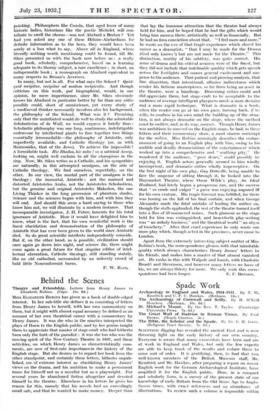Behind the Scenes
Theatre and Friendship. Letters from Henry James to Elizabeth Robins: (Cape. 10a. 6d.) MISS ELIZABETH ROBINS has given us a book of double-edged interest. In her sub-title she defines it as consisting of letters from Henry James to herself, with her own commentary on them, but it might with almost equal accuracy be defined as an account of her own theatrical career with a commentary by Henry James. It was she who in the nineties interpreted the plays of Ibsen to the English public, and by her genius taught them to appreciate that master of stage-craft who had hitherto been only the butt of the parodist : it was she too who was the moving spirit of the New Century Theatre in 1897, and these activities, on which Henry James so characteristically com- ments, are now of first-rate importance in the history of the English stage. But she desires us to regard her book from the other standpoint, and certainly these letters, hitherto unpub- lished, are of extreme interest as elucidating Henry James' views on the drama, and his ambition to make a permanent name for himself not as a novelist but as a playwright. For several years he abandoned fiction altogether and devoted himself to the theatre. Elsewhere in his letters he gives his reason for this, namely that his novels had an exceedingly small sale, and that he wanted to make money. Deeper than that lay the immense attraction that the theatre had always held fur him, and he hoped that he had the gifts which would bring him success. there, artistically as well as financially. But he had no firm conviction about that. "I feel more and more," he wrote on the eve.of that tragic experience which closed his career as a dramatist, "that I may be made for the Drama (God only knows !) but am not made for the Theatre." This distinction, worthy of his subtlety, was quite correct. His sense of drama and his critical acumen were of the finest, but they-did not include that indefinable quality. which gets speech' across the footlights and causes general excitement and sus- pense to the audience. That patient and piercing analysis, that fine dissection, that intentional, allusive indirectness which render his fictions masterpieces, so far from being an asset in the theatre, were a handicap. Discerning critics could and did appreciate them, but stage-craft to be acceptable to the audience of average intelligent playgoers needs a more decisive and a more rapid technique. What is dramatic in a book, when the reader can go at his own pace, turning back, if he wills, to confirm in his own mind the building up of the situa- tion, is not always dramatic on the stage, where the method must be swifter, and, in its way, coarser. Though Henry James was ambitious to succeed on the English stage, he had, as these letters and their commentary show, a most sincere contempt for the milieu. Miss Robins amusingly describes the embar- rassment of going to an English play with him, owing to his audible and deadly denunciations of the entertainment which worked up into a comprehensive and scathing pity." He wondered if the audience, "poor dears," could possibly be enjoying it. English actors generally seemed to him wholly incompetent, and dramatic critics wholly imperceptive. On the first night of his own play, Guy Donicille, being unable to face the suspense of sitting through it, he looked into the Haymarket Theatre, where. Oscar Wilde's play, An Ideal Husband, had lately begun a prosperous run, and the success that "so crude and vulgar" a piece was enjoying augured ill for his own venture. His tragic forecast was fulfilled, for there was booing on the fall of his final curtain, and when George Alexander made the fatal mistake of leading the author on, though the stalls applauded, the rest of the theatre turned itself into a Zoo of ill-mannered noises. Such glamour as the stage held for him was extinguished, and henceforth play-writing was "an unholy business," and the theatrical world" an abyss of treachery." After that cruel experience he only wrote one more play which, though acted in the provinces, never came to London.
Apart from the extremely interesting subject-matter of Miss Robins's book, the correspondence gleams with that inimitable quality which always characterizes Henry James' letters to his friends, and makes him a master of that almost vanished art. He ranks in this with Walpole and Lamb, with Charlotte Bronto and Stevenson, and however many letters we have of his, we are always thirsty for more. We only wish this corre-














































 Previous page
Previous page